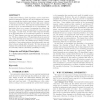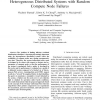451 search results - page 14 / 91 » Performance evaluation with temporal rewards |
SIGIR
2010
ACM
13 years 11 months ago
2010
ACM
Collaborative Filtering (CF) algorithms, used to build webbased recommender systems, are often evaluated in terms of how accurately they predict user ratings. However, current eva...
ML
2002
ACM
13 years 7 months ago
2002
ACM
TD() is a popular family of algorithms for approximate policy evaluation in large MDPs. TD() works by incrementally updating the value function after each observed transition. It h...
JAIR
1998
13 years 7 months ago
1998
Scheduling dialogs, during which people negotiate the times of appointments, are common in everyday life. This paper reports the results of an in-depth empirical investigation of ...
PKDD
2009
Springer
14 years 2 months ago
2009
Springer
The goal of approximate policy evaluation is to “best” represent a target value function according to a specific criterion. Temporal difference methods and Bellman residual m...
IPPS
2009
IEEE
14 years 2 months ago
2009
IEEE
—The problem of finding efficient workload distribution techniques is becoming increasingly important today for heterogeneous distributed systems where the availability of comp...


